Massachusetts
Thursday’s Massachusetts Gaming Commission meeting should have started with a bit of good news for Thoroughbred racing in the Commonwealth: It had a vetted application from Suffolk Downs to run three days this year on its agenda. It had a recommendation from state racing director Alex Lightbown to approve that application. It had Suffolk Downs COO Chip Tuttle in the room to answer any lingering questions about the proposed plan, which called for an organization helmed by racetrack executive Lou Raffeto to run live racing on August 8, September 5, and October 3 for up to $500,000 in daily purses, with at least three state-bred stakes carded.
Instead, after 75 minutes of sometimes contentious discussion and occasionally fantastical testimony from trainer Bill Lagorio that the Stronach Group was interested in leasing the track to run a full meet, the Commission voted 4-1 to delay a decision on the application for two weeks, in the vague hope of establishing that interest. “We would be interested in a bigger deal, if a bigger deal could be made,” said Commission chair Steven Crosby. “I would like to know if there is a viable option out there.”
Commissioner James McHugh was alone in pushing back, asking how two more weeks would clarify the situation. A letter of interest from the Stronach Group had been requested, he said, “and it didn’t materialize.”
Prediction: It won’t. The Stronach Group sent a rather tepid statement via email re: the discussions reported by Lagorio and confirmed by Tuttle:
The horsemen contacted The Stronach Group to see if there was any interest. We contacted the ownership of Suffolk Downs to see if there was any way to participate in the racing operation. We’re a racing company, we look at racing properties. Boston is a big market and we have a lot of racing content. There is absolutely nothing in place after a few calls were made.
Lagorio, the leader of a group of horsemen opposing the three-day plan on the grounds that it doesn’t adequately support Massachusetts racing, recounts more positively his conversations with Stronach COO Tim Ritvo in a July 20 letter to commissioner Gayle Cameron (page 27 in this PDF):
I also had major breakthrough with the Stronach Group, on Thursday afternoon I received a call from Tim Ritvo … he told me his company had reviewed everything I had presented to him … and that they would like to be … here in the Commonwealth … Stronach views the Boston market as being untapped with unlimited potential; they’re looking for an opening to make it possible … Tim wasn’t sure if he would be able to make on the 23rd but said he would email the commission to verify to you their interest in making Massachusetts part of their success story.
At one point in Thursday’s meeting, the trainer said that the Stronach Group was so sure of Massachusetts’ racing promise that Ritvo had said they “didn’t need” the Race Horse Development Fund, which is funded by a percentage of casino license fees and revenues. The money is split 75-25 with the state’s harness racing industry and is available to support purses and breeding.
“Anyone who says they don’t need the Race Horse Development Fund is crazy in my mind,” replied Crosby.
Tuttle told the Commission that Ritvo “expressed a polite level of interest.”
The opposition horsemen would like to run at least 50 days and believe the $1.7 million in Race Horse Development Fund money allocated for the proposed purses in the three-day plan is better banked for a longer meet. Lagorio stated in Thursday’s meeting that $1.7 million could support several weeks of racing at the level it was run at Suffolk Downs in 2014 — never mind that that’s hardly the kind of racing anyone wants to watch or bet, or the sort of meet a shrinking industry with too-few foals is capable of supporting.
Crosby became caught up enough in the possibility of Stronach interest that he tried exploring how the Commission could use their power over Suffolk Downs’ simulcasting license to compel negotiations. “What’s the incentive for Suffolk Downs to negotiate?,” the chair asked after McHugh noted that without control of the simulcast signal, the Stronach Group wouldn’t see value in a lease to run racing. The subject was dropped when Tuttle protested that there was no reason for the Commission to compel any talks with an application for racing that met all statutory requirements pending.
“I’m speechless at this point,” he said. “To allow the leader of the dissidents to get up and talk about a potential offer that realistically has no merit in the long run? They can talk about it all they want, but as soon as the Stronach people come and take one look at the balance sheet of Suffolk Downs, they’re going to run so far in the other direction, and the horsemen will be left hanging.
“There is no way in the world that any other entity can come in here and lease this track and make it viable. I’ve seen the balance sheet and that’s the fact.”
That fact is why an earlier proposal for the New England HBPA to lease the track and run a full meet this year had to be scrapped when it became apparent that — even with the Race Horse Development Fund and a legislative rejiggering of revenue splits — there was no way to run without still losing money. The national HBPA and New England HBPA support the three-day plan.
Tuttle told Matt Hegarty at Daily Racing Form (DRF+):
“I’ve learned to expect the unexpected with this commission,†he said. “We reached a deal with the horsemen and breeders, and we are going to do our best to honor that, within reason. If we get any additional delays, we’re going to have to look at some other options.â€
Suffolk’s COO also pointed out that the Stronach Group has had plenty of time to make something of their interest, telling Snierson:
“The Stronach Group is a very reputable and respectable racetrack operator, but they have had 10 months to kick the tires and express any legitimate interest, and we have never seen a proposal from them.”
Years, actually. Rumors of Frank Stronach taking an interest in New England racing have been floated since at least the early ’00s, when he sent a string of horses to Suffolk Downs. “We need a legitimate racetrack operator,†Lagorio said to the Boston Herald. “The answer to racing in Massachusetts for years to come is the Stronach Group.†The trainer was pushing a similar line in 2005, the year before the current Suffolk Downs ownership group took over:
“It’s a great track for Stronach,†Lagorio said, citing the money the gambling chief could make “resurrecting this track and making it a showplace.â€
Some dreams die hard.
Plainridge Park’s new slots and video gaming parlor took in $6,154,626.38 during its first week of operation, or more than $703 for each of the 1,250 machines per day. Even considering opening week excitement and whatever pent-up local demand there might have been, that’s an impressive haul.
“More than $6 million — that’s an incredible number … Plainridge is showing it can certainly compete with the existing casinos,” New England casino market expert Clyde Barrow tells the Boston Globe.
The nine percent of those revenues designated for the Race Horse Development Fund totaled $553,916.37; that’s $138,479 for harness racing, which takes place at Plainridge. I was going to insert a sentence or two here noting how much Plainridge handled on live racing during the same period, and maybe try to draw a conclusion from the slots-RHDF-handle numbers, but tracking down harness handle figures turns out to make Thoroughbred racing look like a transparent, open industry. (Harness friends, any tips?)
So, let’s use 2014 numbers, taken from the racing office’s annual report (PDF): Last year, the track handled a total of $1,108,715 on-track on 82 race days, or $13,521 per card, and handled another $6,576,620 on its simulcast feed, for an average of $93,724 per card. Pull the Pocket does a bit of estimation/comparison:
Let’s say Plainridge does $100,000 in handle per card. At a low signal fee, let’s set revenue at 5% of that handle, which would mean the track and purses would drive $5,000 per card in revenue.
If they race three cards a week, that’s $15,000 in revenue.
$15,000 from racing, $567,000 from slots.
His conclusion: There’s no point to doing the work of growing handle when there’s so little payoff compared to the casino money. Plainridge is booked for 105 cards this year. Assuming they average about the same per card as last year, they’ll handle almost $10 million, while paying out approximately $4 million in purses (estimate based on averaged recent daily purse levels; in 2014, Plainridge paid $2.6 million in purses). There’s not much incentive to push casino patrons into betting on the local racing product either: The track’s portion of daily live handle runs roughly $1400 per card on-track, or about the gross on two slot machines.
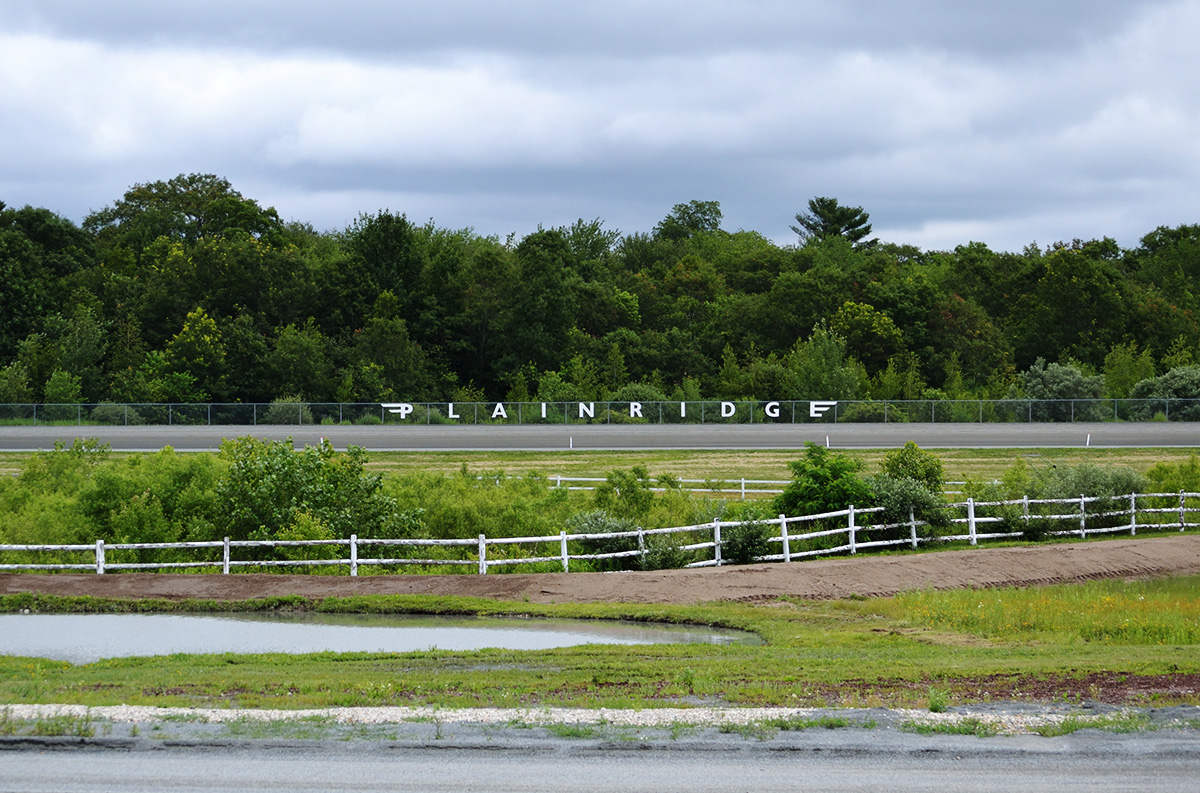
It’s the only horse racing going in Massachusetts right now, so I went to Plainridge Park on Monday to catch Thursday’s rescheduled card. First post was 11:00 AM — too early to enjoy a snack before at Doug Flutie’s Sports Bar, although not too early for the crowd that was already settling into the new, cacophonous casino floor with its 1,250 slot and video gaming machines. When I emerged onto the track apron — after following a winding hallway that lost more glitz the closer it got to the beige and Formica simulcasting room — it was almost a relief to count only 28 other people out there with me.
That number went up, although not by much. By noon — that was race four — fewer than 100 people were along the rail or watching the flat screens inside. What I took for a larger group in the simulcasting room turned out to be eager casino patrons signing up for players’ rewards cards — Plainridge was processing their new loyalists in the one place they had space and the noise level didn’t make it impossible to capture that all-important marketing data.
I don’t know much about Standardbreds or harness racing, except that they’re sturdy animals who often run weekly and that horses breaking from the one hole have an outsized chance at winning because of likely ground saving. I also know that at Plainridge they’re now running for higher purses funded by casino licensing fees and a percent of gaming revenues via the 25% split harness racing gets from the state’s Race Horse Development Fund, which makes total handle a little less of a concern for horsemen and the track, and that — today, anyway — they were running races every 12 minutes. It was almost as though they were running the card as a formality.
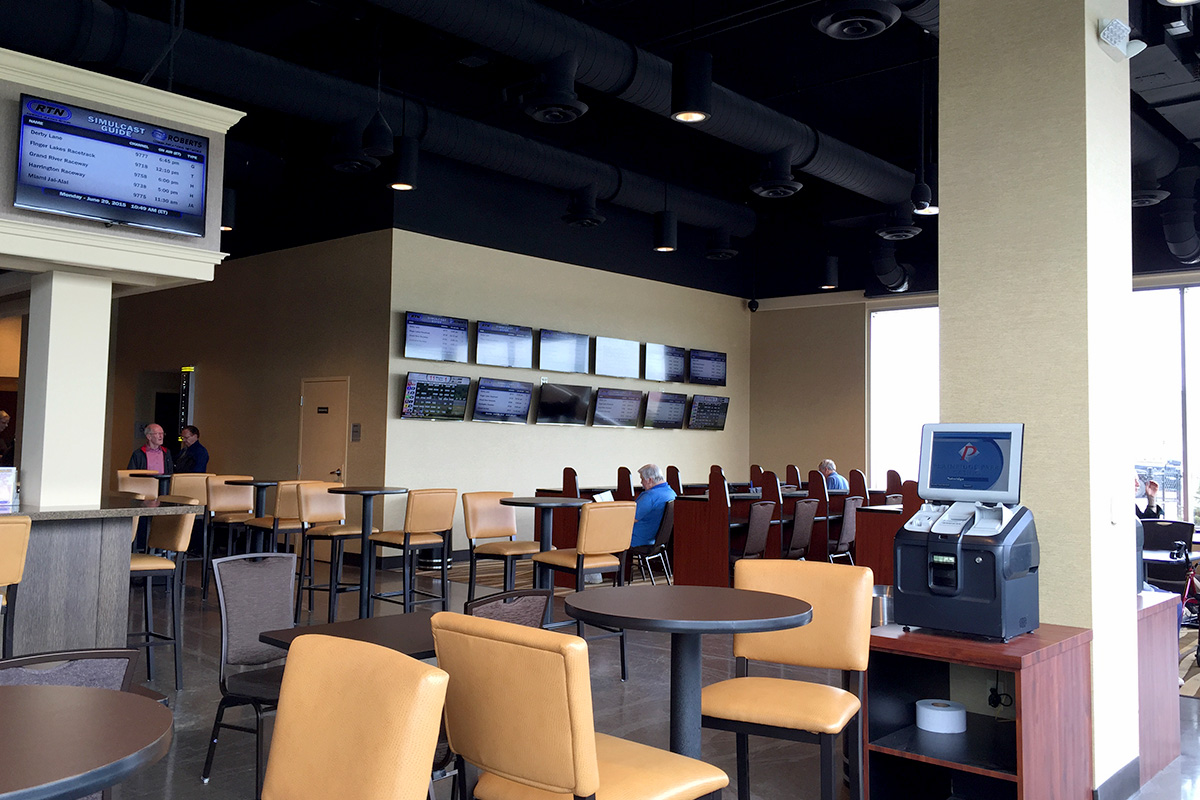
The Plainridge Park simulcasting room.
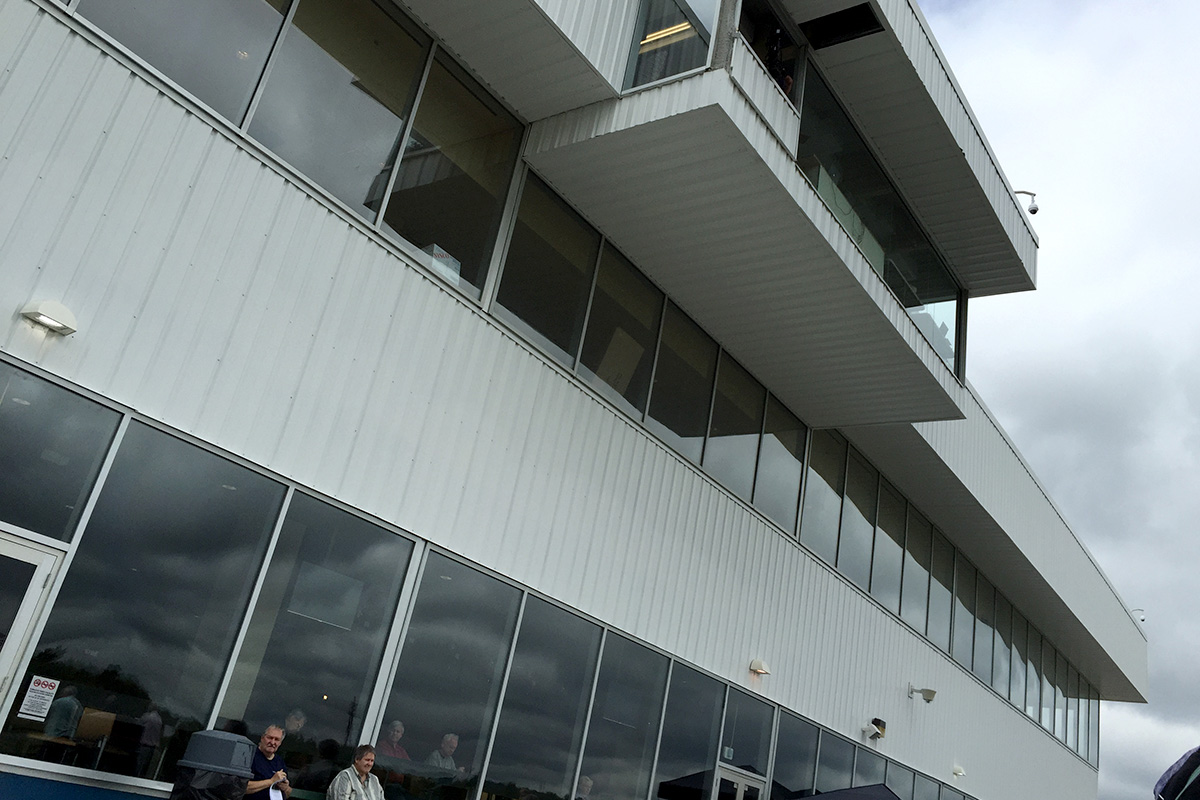
Grandstand exterior. Tents and picnic tables were set up along the wall.
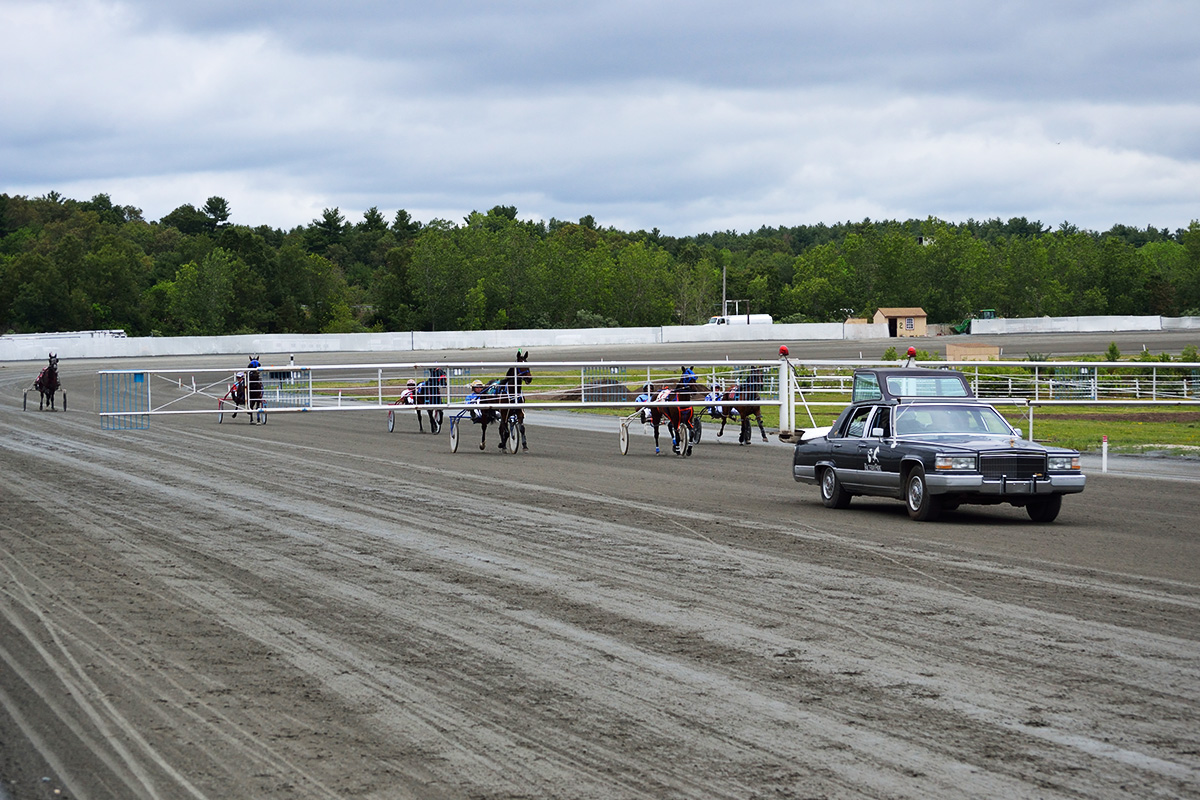
Lining up for the start of a race. A classic car with “Raceway Park” stenciled on the doors handled gate duty.
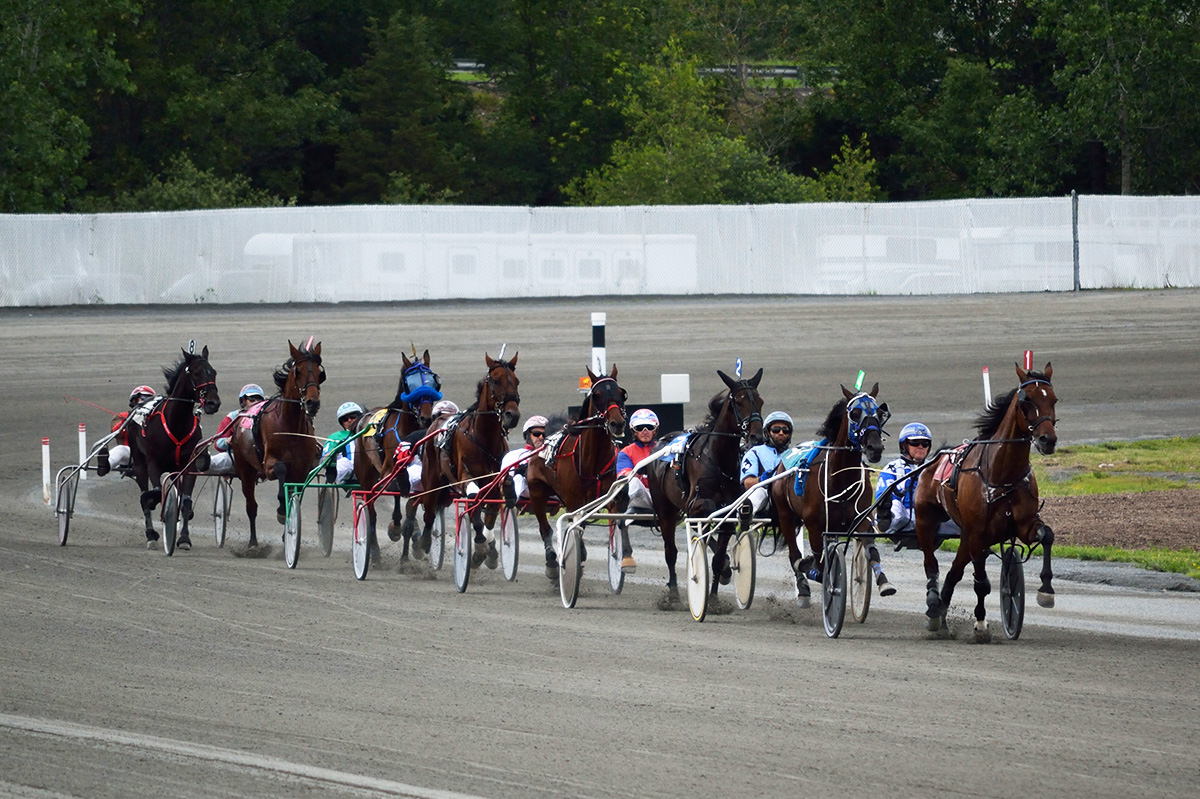
Coming down the stretch for the first time.
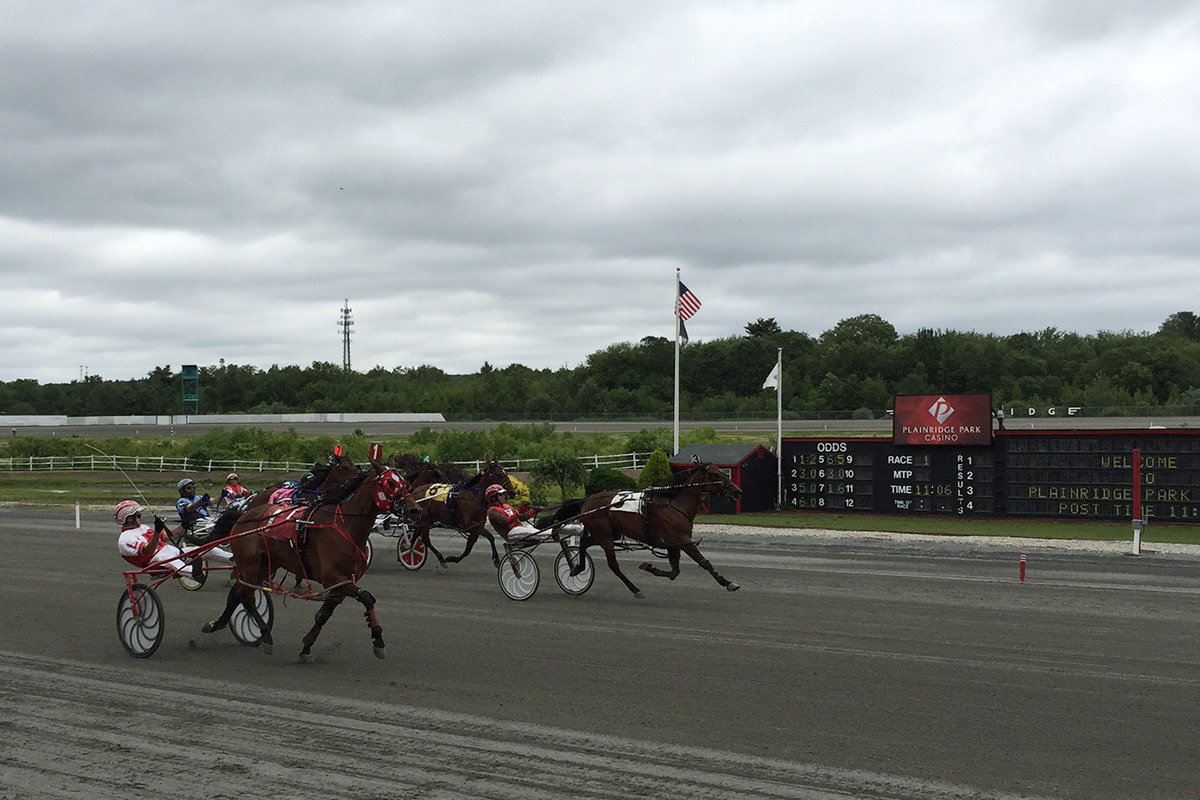
Debs Girloffortune (#1, outside) wins the first race.
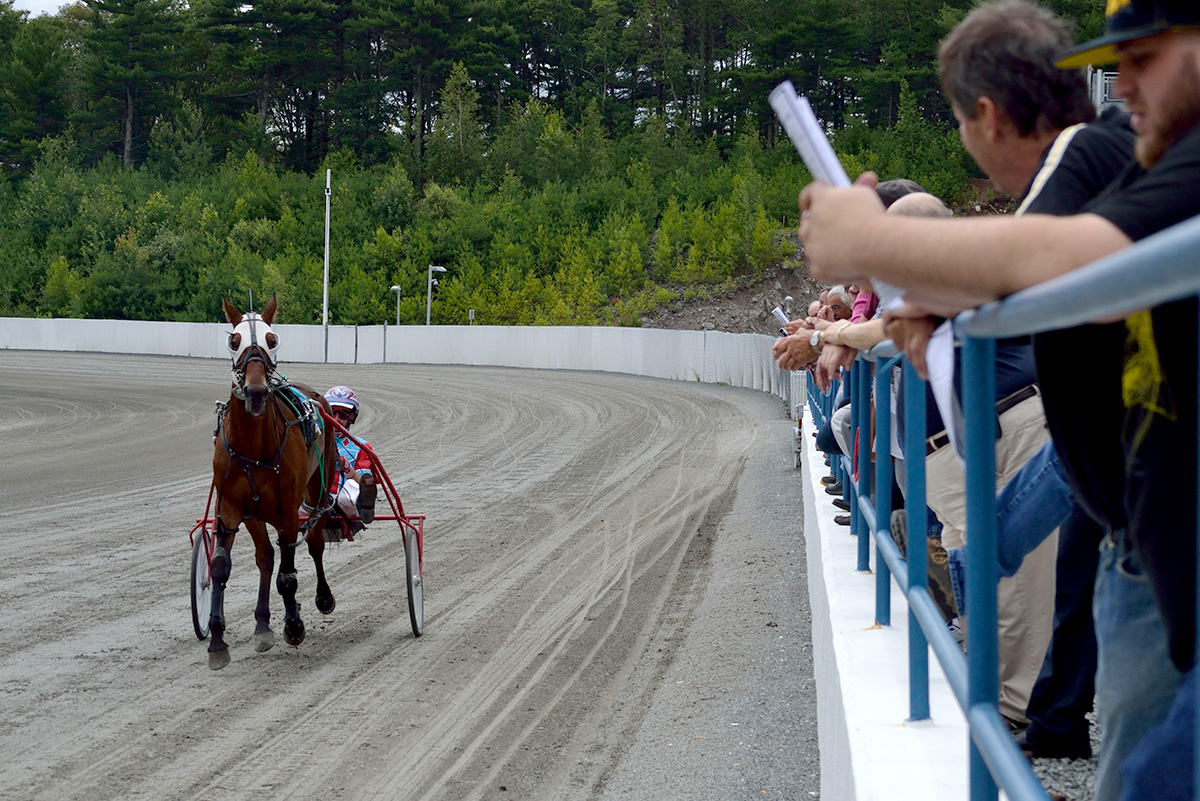
A horse warms up in front of the crowd along the rail.
Copyright © 2000-2023 by Jessica Chapel. All rights reserved.